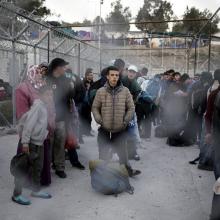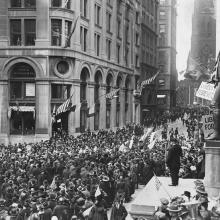world war I
A population exchange with Turkey after World War I brought in over a million ethnic Greeks as refugees. When the new migration crisis began last year, there was empathy for the new arrivals, with many Greeks recalling what their grandparents went through.
But even given that proud history, academics and volunteers fear that the warm welcome of the last year could wear thin, when the refugees start to integrate in a nation that has long resisted a multifaith identity.
Some called it “The Great War.” Others called it “The War to End All Wars.” History proves it was neither.
As the world marks the 100th anniversary of the outbreak of World War I — a conflict that left 37 million dead or wounded and reshaped the global map — a number of scholars and authors are examining a facet of the war they say has been overlooked — the religious framework they say led to the conflict, affected its outcome and continues to impact global events today.
More than that, they argue, today’s religious and political realities — ongoing wars, disputed borders and hostile relationships — have their roots in the global conflict that began when Austria-Hungary declared war on Serbia on July 28, 1914.
Today’s veterans are suffering through the current recession. They have a higher unemployment rate are are more likely to be or become homeless than the rest of the U.S. population.
Thankfully, the Senate yesterday unanimously passed jobs for veterans legislation that should begin to help.
But other problems remain. As many as 25 percent have symptoms of post-traumatic stress disorder and suicides are rising. Forty-six-thousdand have suffered devastating physical injuries, and as many as 360,000 may have brain injuries.
With this set of problems, the Veterans Administration doesn’t have the necessary resources to meet the profound need.
Before Veteran’s Day was Veteran’s Day, it was Armistice Day.
On the 11th hour of the 11th day of the 11th month in 1918, the cessation of hostilities of World War I took effect.
It was supposed to be the end of the "war to end all wars."
In 1926, Congress passed a resolution to commemorate the day “with thanksgiving and prayer and exercises designed to perpetuate peace through good will and mutual understanding.”
In 1938 the day became known as “Armistice Day” with the intent that it would be a day dedicated to the world peace.
In 1954, after World War II, when the world stood in horror at the sight of the Nazi genocide machine and ghastly bombings of civilian populations culminating in the first ever deployment of nuclear bombs, the day became known as Veteran’s Day — a day to honor military service.
I say if we are to truly honor veterans, we ought to remember and honor Armistice Day with the hope that we can bring an end to violent conflict within and between nations.



